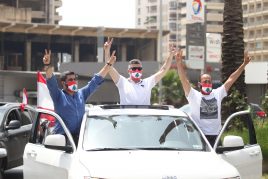
Lebanon is going through a difficult time, having already been hit by a severe economic crisis, and now facing the Covid-19 pandemic. High social tension led to a number of street protests. The poverty rate across the country reached unprecedented lows. The Lebanese government took restrictive measures immediately after the first cases were reported, ordering the total shutdown of all activities, both public and private with the exception of essential sectors, applying an evening curfew (from 7 p.m. to 5 a.m.) and enforcing odd-even license plate policy for circulation on weekdays.
 On 4 May, the Country saw the start of Phase 2, in 5 steps until 8 June, providing for easing of coronavirus lockdown restrictions. These include the reopening of restaurants, albeit only 30% of their accommodation capacity, barber shops, but only until Wednesdays. Hairdressers and beauticians will be open from Thursday to Saturday. Car dealerships and clothing stores have also reopened from the 4th. Walking on the promenade is allowed, but only with masks and respecting social distancing. Beirut Airport is scheduled to reopen on 8 June.
On 4 May, the Country saw the start of Phase 2, in 5 steps until 8 June, providing for easing of coronavirus lockdown restrictions. These include the reopening of restaurants, albeit only 30% of their accommodation capacity, barber shops, but only until Wednesdays. Hairdressers and beauticians will be open from Thursday to Saturday. Car dealerships and clothing stores have also reopened from the 4th. Walking on the promenade is allowed, but only with masks and respecting social distancing. Beirut Airport is scheduled to reopen on 8 June.
Concerns over IDP camps. “The efforts of the Ministry of Health, together with the Red Cross and other organizations against the Coronavirus are bearing fruit,” Father Michel Abboud, President of Caritas Lebanon, told SIR.
 The numbers would seem to allow for a certain degree of optimism: “As of May 5, there were 750 confirmed cases throughout the country, with 25 deaths.” What worries the priest is “an eventual spread of the virus in the Syrian and Palestinian refugee camps. If it were to happen it would be a tragedy.” Lebanon hosts the largest number of refugees per capita. Several humanitarian agencies and NGOs are helping displaced people with hygiene awareness-raising and sanitation promotion campaigns, both digital (via telephone and social networks) and in camps where hygiene kits and food parcels have been distributed, as confirmed by the Italian NGO AVSI. Save the Children is working to financially support more than 2,100 Lebanese, Syrian and Palestinian families, providing food, hygiene, education and basic necessities packages to more than 32,000 families and ensuring better living conditions for 980 Syrian refugee families.
The numbers would seem to allow for a certain degree of optimism: “As of May 5, there were 750 confirmed cases throughout the country, with 25 deaths.” What worries the priest is “an eventual spread of the virus in the Syrian and Palestinian refugee camps. If it were to happen it would be a tragedy.” Lebanon hosts the largest number of refugees per capita. Several humanitarian agencies and NGOs are helping displaced people with hygiene awareness-raising and sanitation promotion campaigns, both digital (via telephone and social networks) and in camps where hygiene kits and food parcels have been distributed, as confirmed by the Italian NGO AVSI. Save the Children is working to financially support more than 2,100 Lebanese, Syrian and Palestinian families, providing food, hygiene, education and basic necessities packages to more than 32,000 families and ensuring better living conditions for 980 Syrian refugee families.
Extreme poverty. “The economic crisis worsened by the Coronavirus is also of great concern,” said Father Abboud. the country is sorely tried by months of mass protests calling for the dismissal of the corrupt political class and reforms to revive the economy, and on 7 March the government announced sovereign default.
 Violent protests broke out in several cities across Lebanon; protestors attacked and damaged banks following orders of asset freeze and money transfers. On 1 May last, the government led by Prime Minister Hassane Diab submitted a request for $10 billion in financial support from the International Monetary Fund (IMF), based on an economic reform plan, in addition to the $11 billion already approved at the Conference of Donor Countries held in Paris in 2018. The plan was equally endorsed by the Lebanese Church, as stated by the Maronite Patriarch, Card. Bechara Raï, during the Mass last Sunday, in Harissa, for the feast of Our Lady of Lebanon.
Violent protests broke out in several cities across Lebanon; protestors attacked and damaged banks following orders of asset freeze and money transfers. On 1 May last, the government led by Prime Minister Hassane Diab submitted a request for $10 billion in financial support from the International Monetary Fund (IMF), based on an economic reform plan, in addition to the $11 billion already approved at the Conference of Donor Countries held in Paris in 2018. The plan was equally endorsed by the Lebanese Church, as stated by the Maronite Patriarch, Card. Bechara Raï, during the Mass last Sunday, in Harissa, for the feast of Our Lady of Lebanon.
“There is growing unemployment,
families have nothing or almost nothing left to live on,
people are on the brink of poverty,” remarked the president of Caritas Lebanon. The local Lebanese lira has lost 63% of its value on the informal market, thereby eroding purchasing power. “The currency depreciation – Father Abboud pointed out – makes it impossible to buy basic goods even for those who are still employed. Those with some savings to spare have already spent them to feed their family members.” But while some people abide by government regulations, there are also those, especially in the poorest areas, who break the rules and do their best to keep on working.
 Coordinated relief. “As Caritas – explains Father Abboud – we are assisting some 20 thousand families, but there are many more in need of material and medical help. Our effort now is to provide them with whatever support they need.”
Coordinated relief. “As Caritas – explains Father Abboud – we are assisting some 20 thousand families, but there are many more in need of material and medical help. Our effort now is to provide them with whatever support they need.”
“It’ s unacceptable to see children crying out of hunger. We are receiving a great number of requests for help every day. This requires coordination of all forms of assistance so as not to waste resources and time”.
“We set up a Crisis Committee with the Maronite Church prior to the pandemic, and are now organizing local assistance in order step up efforts in the area. The project is taking shape but we need financial support to create a fund that we can draw on to meet people’s needs. For this we place great trust in international aid from the Churches and Caritas sisters.”











